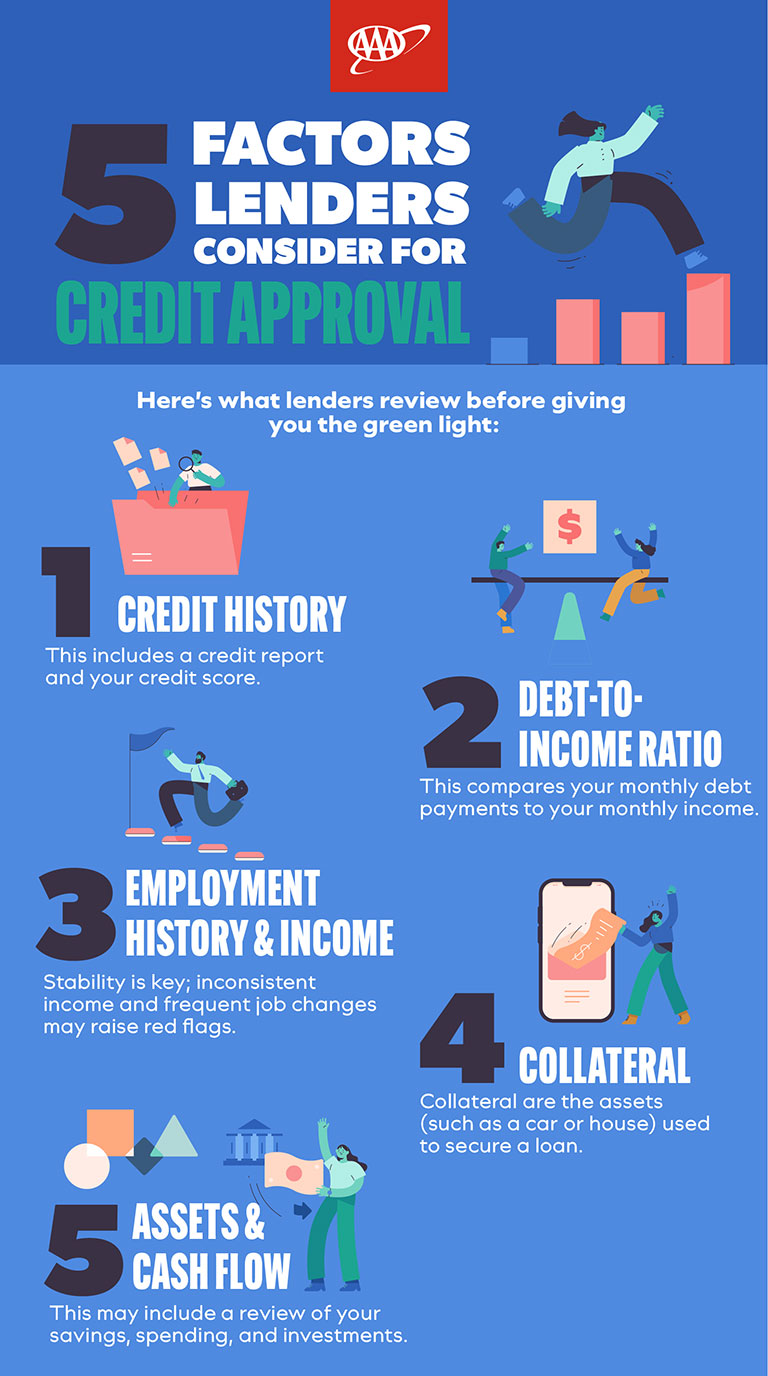5 Factors Lenders Consider for Credit Approval
From credit history to collateral, here’s what you need to know to increase your credit approval odds



Whether you’re applying for a loan for your dream car, your forever home, or a new credit card, there are a few key factors lenders consider before approving your application. These factors also help determine things such as your interest rate, credit limit, and loan terms.
So, what do lenders look for? While each lender has its own set of credit requirements, there are a few standard factors they typically check. Here’s a breakdown of what lenders review before giving you the “credit” green light.

1. Credit history
Lenders want to see that you can handle credit responsibly before they’ll approve your application, and your credit history plays a key role in this assessment. Think of it as your “credit report card,” which includes two main components: your credit report and your credit score.
Credit report
This shows how well you manage credit, including details about past loans, credit cards, car loans, and mortgages. Missing or late payments can hurt your credit history, making you seem like a bigger risk. A strong credit history, on the other hand, can improve your chances of approval and help you secure better loans and credit limits.
Credit score
This is a three-digit number ranging between 300 and 850, calculated from your credit report details. Generally, the higher your score, the less risky you appear to lenders. The most widely used model is the FICO Score, with a score of 800 or above considered excellent, helping you qualify for the best rates. Specific benchmarks, however, may vary by lender.
2. Debt-to-income ratio (DTI)
Lenders also assess how much debt you currently have to determine how much room your budget has to make monthly payments.
They do this by calculating your DTI. This compares your monthly debt payments to your monthly income. The evaluation includes factors such as credit card payments, loans, and other outstanding debts.
Generally, a DTI under 50 percent increases your chances of credit approval. If you’re applying for a mortgage, however, lenders usually want your DTI to be even lower.
Keep in mind, though, every lender has its own criteria. For example, if your gross income is $5,000 per month and your revolving debt payments total $2,000, your DTI would be 40 percent. This DTI would fall under the typical DTI threshold for many lenders.

3. Employment history and income
Before approving a loan, lenders want to make sure you can afford the monthly payments. To do this, they review your employment history and income to confirm you have a stable source of income.
Frequent job changes or inconsistent monthly income may raise red flags for some lenders. To improve your chances of credit approval, it’s important to show proof of a steady income and a reliable work history.
4. Collateral
When you apply for a secured loan, the loan is backed by something you own, such as a car or a house. This is called collateral.
The lender will look at how much your collateral is worth and subtract any remaining debt you owe on it. The difference is called equity, which helps the lender decide whether to approve your loan.
For example, when applying for a mortgage, conventional lenders may require a 20 percent down payment, which represents the equity in your home.
But here’s the important part: if you don’t make your loan payments, the lender can take away the asset you used as collateral. So, it’s crucial to stay current on your monthly payments.
5. Assets and cash flow
When applying for a mortgage, lenders usually review your savings, investments, and other assets to assess your financial stability. Even if your credit report isn’t perfect, having money saved up and managing it well can demonstrate fiscal responsibility, which may improve your chances of credit approval.
Lenders may also review your bank account to understand your income and spending habits. Showing that you handle your money responsibly can help increase your credit approval odds.
…
Knowing what lenders look for can help you prepare for the loan application process. Checking your credit score and gathering the right documents in advance can streamline the process and increase your chances of credit approval.
